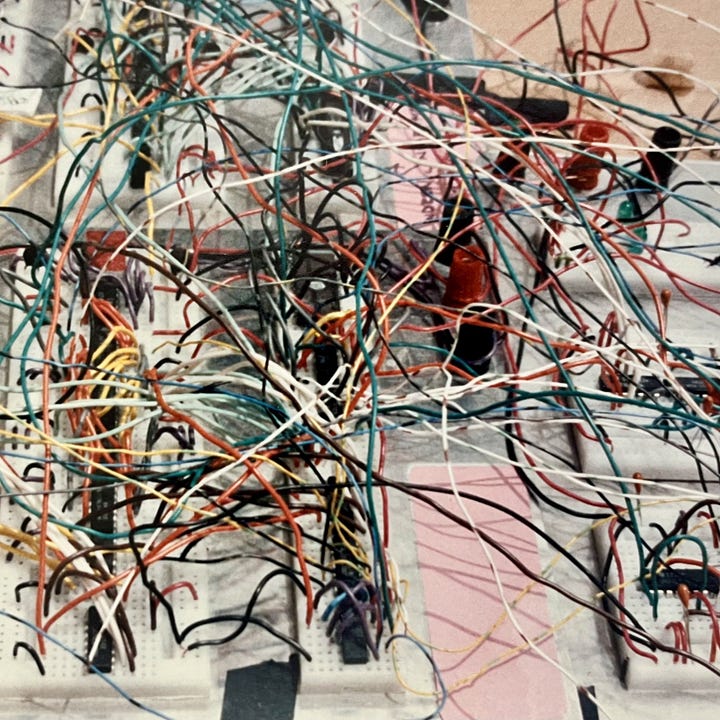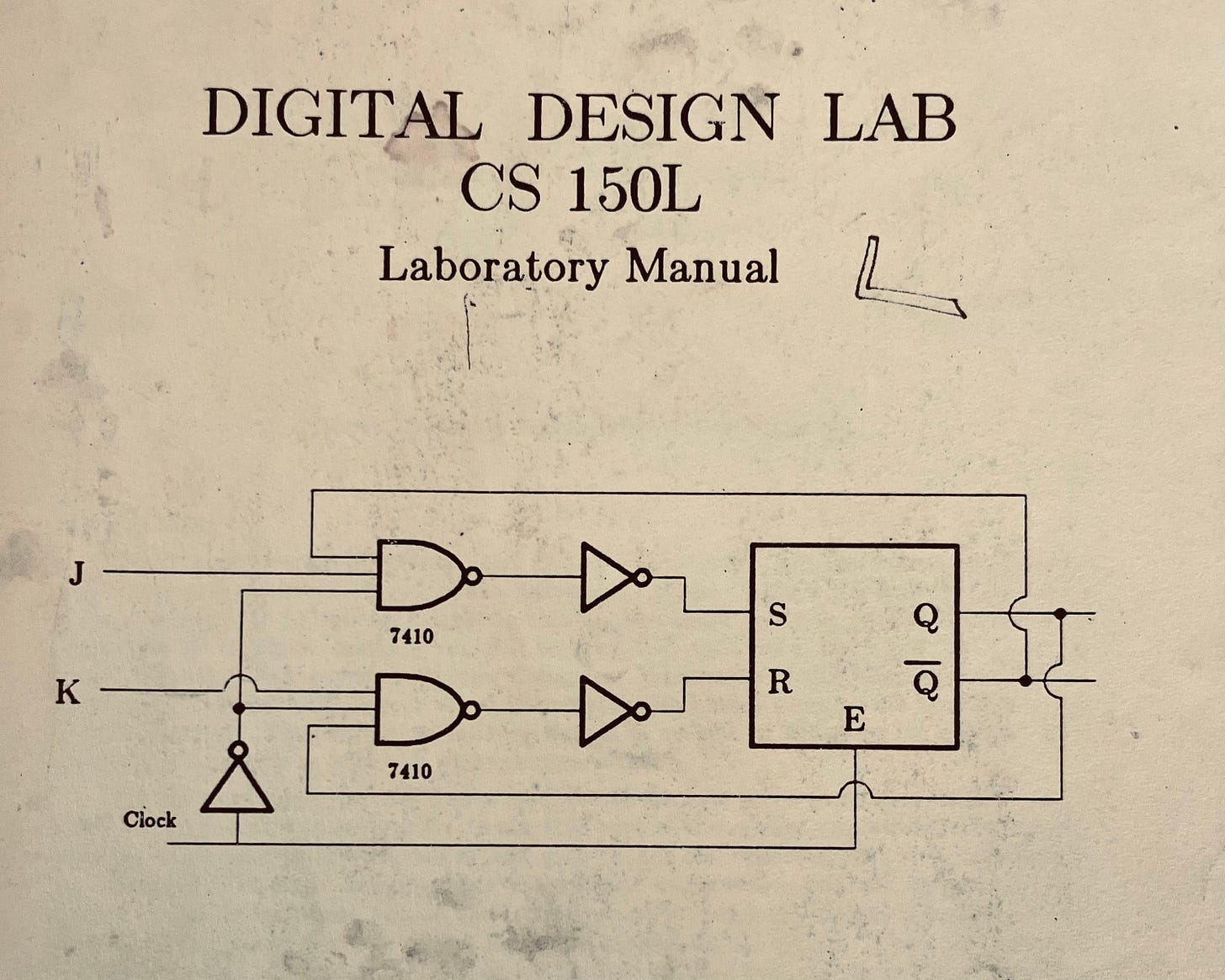The time I nearly electrocuted myself
Electricity hasn't always been kind to me, but the future looks bright 😎
I think I was 8 and we had been talking about electricity in school. My teacher brought in a special guest who amazed us with feats of magic. Later that week I was home sick from school with little to entertain myself when I spied with my little eye, an extension cord snaking out from underneath my bed. What would happen if I stuck a wire into the two plugs?
I don’t remember the shock as much as the smoke and the smell and how the extension cord and the sheet turned black. It all happened so fast! No time for regrets.
My parents were displeased and talked to the teacher who in turn scolded me because hadn’t she told us not to play with electricity? I didn’t remember that.
Albeit with a bit more respect, I played with electricity all the way through high school.
My dad got me an old tabletop train set that sometimes ran, along with boxes of extra track and engines and wires and parts. The ratchety transformer hummed and smelled of ozone, dominated by a black plastic knob with a crank to increase the current and make the train engines whine and try ever harder. I wired up switches between track segments with relays that you flipped just as the engine approached. This made for the best derailments which were frequent and terrifying for my cat.
Once I busted all the engines beyond the point of repair, I saved up to buy a new one. Ironically, I picked a classic steam locomotive with a coal tender, complete with a working headlamp over the front wedge fender. It was faster than all the old ones and could pull a long string of box cars. Years later that engine got called back into duty for the science fair where I crammed an electric siren in a box car for the engine to pull along a length of track to show the Doppler effect. It was super loud and annoying, and I didn’t win anything.
Model rockets took over from trains and while the launches were cool, they couldn’t top building an overengineered and completely unnecessary launch controller. Radio Shack supplied me with the housing and super cool switches and LEDs and wires and plugs. All this to send a jolt out from a 9V battery to an igniter you taped to the bottom of the engine.
You know how to check if a 9V battery is still good? Stick it on your tongue and gauge the buzz!
Alas, electricity turned on me once again in college. CS 150, Digital Design and Computer Architecture was more traumatic to my tender 21-year-old psyche than the extension cord incident. 8-year-olds have No Ragrets.
CS 150L was the lab and the final project was to build a digital alarm clock.
The clock was the kind made up of four fat red LED digits found on every nightstand in America back then. Sharp still makes them! The Electrical Engineering (EECS) department at Berkely had a parts depot where you picked up the components you needed as well as specialty chips called PAL or Programmable Array Logic chips. PAL chips were supposed to make it easier as you could program the logic you wanted in the onboard memory (PROM). You stuck the PALs and LEDs and supporting components in rectangular ‘breadboards’ connecting them into the circuits you needed with wires.
The class was rough, the lab was rougher. I didn’t help myself by picking a lab partner that was just as lost as me. It took us 3 breadboards, many late nights and sooo much wire - we just kept adding on when we couldn’t get it to work until it was too complicated to troubleshoot. You couldn’t set the time or the alarm without setting both so the alarm would immediately go off. 😭
Just as my Astrophysicist career aspirations were doomed by Physics 1A, my Electrical Engineering aspirations were doomed by CS 150L.
Our breadboard rat’s nest versus logical design:


David is taking a class right now with the coolest name ever - Mechatronics or EME 154 - look what he gets to play with! Breadboards have gotten better. David is smarter both in the noggin and at picking lab partners plus that kit looks super cool, so I expect he’ll fare better than his dad.
While I took a sharp turn from electricity into the relative comfort of computer science, electricity and particularly the engineering of renewable power has made crazy progress.
It is cheaper today, to create new power sources from solar panels than from coal or natural gas or nuclear:
That means if you are looking to build new capacity - anywhere in the world - you build Solar. If you are looking to replace existing capacity - you build Solar. It’s pure economics now - and with more things needing energy to improve productivity and our lives, this is our future 🌞
Wright’s law, daddy to Moore’s law explains this steep drop in cost. Wright’s law shows how every time manufacturing capacity doubles for a thing, cost drops by a fixed percentage or X. This is also called learning or experience curves and for solar panels X is 20% driving the exponential decrease of solar costs. Traditional fossil fuel plants can’t benefit from Wrights Law because they run on stuff that has to be pulled out of the ground, not built.
Batteries are the Yin to solar’s Yang because we need to keep rolling even when there is a solar eclipse. Yay us, Wright’s law also applies to batteries! X is just under 20% for batteries; consequently, the price of batteries has declined 97% in the past 3 decades:
Part of these curves represent increases in efficiency which means more electricity generated/stored in ever smaller units.
Andrew’s laws of electricity:
First Law - Law of staying alive
Skip sticking wires in electric sockets. Also, don’t dry your hair or make toast in the bathtub. If you want to dance with the God of Thunder, stick a 9V battery on your tongue.
Second Law - Law of moving on
If you can’t build a proper alarm clock, don’t despair - Computer Science is the best.
Third Law - Law of my future’s so bright I gotta wear shades
Solar is not the wimpy secondary power source you have been led to believe, but rather will power our future.
best, Andrew
Check out last week’s article!
A qubit walks into a bar
A qubit walks into a bar and orders a drink. The bartender asks, “Will that be a 0 or a 1?” The qubit says, “Yes.” 🤣 Buckle up! 5 minutes from now not only will you get the joke but also why quantum computing is a big deal. Hold off on that white lab coat though - reading this will not get you any closer to being a for real physicist.






